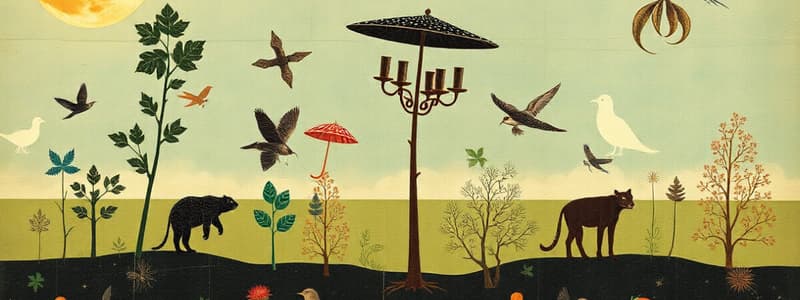Podcast
Questions and Answers
What do food chains show?
What do food chains show?
Feeding relationships between organisms and the flow of energy through an ecosystem.
What is the first part of a food chain?
What is the first part of a food chain?
- Primary consumer
- Secondary consumer
- Tertiary consumer
- Producer (correct)
What are autotrophs?
What are autotrophs?
Organisms that can photosynthesize.
What type of organism is a grasshopper considered?
What type of organism is a grasshopper considered?
What happens to energy as it moves up the trophic levels?
What happens to energy as it moves up the trophic levels?
What is a top carnivore?
What is a top carnivore?
Detritivores and decomposers feed on living organisms.
Detritivores and decomposers feed on living organisms.
In the food web example provided, what eats a cricket?
In the food web example provided, what eats a cricket?
What is the primary consumer in the food chain involving grass?
What is the primary consumer in the food chain involving grass?
Energy is lost at each ______ level.
Energy is lost at each ______ level.
What is the producer in the river food chain?
What is the producer in the river food chain?
What might happen to the population of seals if the population of algae increases?
What might happen to the population of seals if the population of algae increases?
How many levels do food chains usually have?
How many levels do food chains usually have?
What happens to the population of flat winkles if the crab population suddenly decreases?
What happens to the population of flat winkles if the crab population suddenly decreases?
The energy in a food chain comes primarily from the ______.
The energy in a food chain comes primarily from the ______.
Match the following terms with their definitions:
Match the following terms with their definitions:
What is energy transferred in measures of?
What is energy transferred in measures of?
The secondary consumer comes before the primary consumer in a food chain.
The secondary consumer comes before the primary consumer in a food chain.
How is energy lost in a food chain?
How is energy lost in a food chain?
Flashcards
Food Chain
Food Chain
A linear sequence of organisms where each feeds on the previous one, showing the flow of energy through an ecosystem.
Food Web
Food Web
A complex network of interconnected food chains, showing multiple feeding relationships in an ecosystem.
Producer
Producer
An organism that makes its own food (e.g., plants, algae), forming the base of the food chain.
Autotroph
Autotroph
Signup and view all the flashcards
Primary Consumer
Primary Consumer
Signup and view all the flashcards
Secondary Consumer
Secondary Consumer
Signup and view all the flashcards
Tertiary Consumer
Tertiary Consumer
Signup and view all the flashcards
Trophic Level
Trophic Level
Signup and view all the flashcards
Herbivore
Herbivore
Signup and view all the flashcards
Carnivore
Carnivore
Signup and view all the flashcards
Omnivore
Omnivore
Signup and view all the flashcards
Decomposer
Decomposer
Signup and view all the flashcards
Heterotroph
Heterotroph
Signup and view all the flashcards
Energy Transfer
Energy Transfer
Signup and view all the flashcards
10% Rule
10% Rule
Signup and view all the flashcards
Study Notes
Food Chains
- Food chains illustrate feeding relationships and energy flow within an ecosystem.
- Arrows in a food chain depict energy transfer between organisms.
- Food chains begin with autotrophs (e.g., plants, algae, seaweed).
- Autotrophs utilize sunlight to produce their food through photosynthesis.
- Autotrophs are also called producers.
- Other organisms in a food chain are heterotrophs, consuming other organisms for energy.
- These heterotrophs are called consumers.
- Primary consumers (first-order) feed on producers.
- Secondary, tertiary, and sometimes quaternary consumers follow, each feeding on the organism before it in the chain.
- The top carnivore in a food chain is the animal at the end of the chain.
Food Webs
- Food chains are simplistic; food webs offer a more comprehensive view.
- Animals often consume multiple organisms.
- Food webs show interconnections among multiple food chains.
- Seasonal availability of food and nutrient requirements affect organism diets.
Energy Transfer in Food Chains
- Energy is transferred between trophic levels (e.g. producer, primary, secondary consumers).
- Only a small percentage (around 10%) of energy is transferred between trophic levels.
- Energy is 'lost' through various processes like movement, reproduction, and heat production.
- Organisms may not completely digest all parts of consumed organisms (e.g. bone, feathers).
- Other energy is lost from the food chain through wastes like feces and urine.
- Decomposers contribute to energy cycling, processing remaining organism matter.
Studying That Suits You
Use AI to generate personalized quizzes and flashcards to suit your learning preferences.




